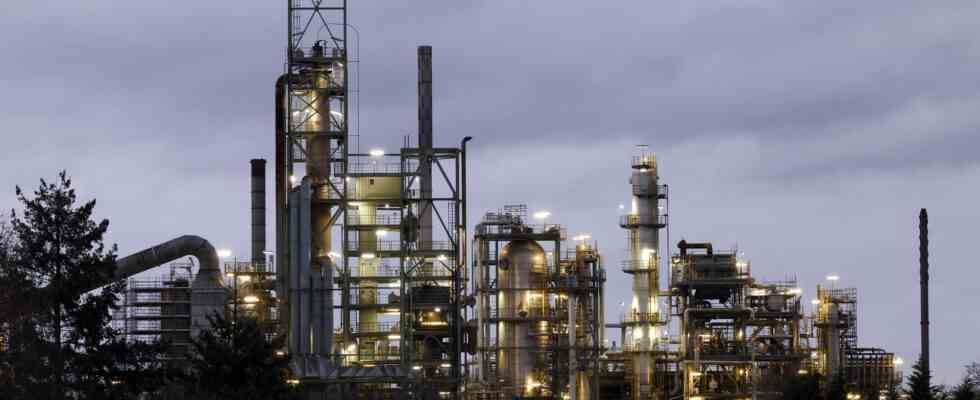Status: 10/27/2022 11:27 am
Thanks to the high oil and gas prices, the European energy companies continue to earn brilliantly. While Shell’s profit is just below its recent record, TotalEnergies’ is even slightly higher.
The sharp rise in oil and gas prices once again brought billions in profits into the coffers of the energy companies in the third quarter. Europe’s largest oil company, Shell, continued to earn excellent earnings from July to September, albeit not at the most recent record level.
The operating result adjusted for special effects (Ebitda) fell by more than 17 percent to around 9.5 billion dollars compared to the record result in the summer, as the group announced today in London. Despite the weaker refinery and gas trading, this is still the second-best quarterly result in the history of the group and significantly more than in the previous year.
Shell shareholders are to participate in profits
The group had already announced a few weeks ago that the margins in the refinery business were not as high as in the second quarter. The bottom line – i.e. adjusted for the valuation effects of oil inventories, for example – earned Shell 6.7 billion dollars after 18 billion dollars in the second quarter. Compared to the previous year, the British oil giant has more than doubled its profits. At that time, Shell was still in the red.
“We are delivering robust results at a time of continued volatility in global energy markets,” said CEO Ben van Beurden. The company continues to use the bubbling profits for high expenses for price maintenance and distributions to shareholders.
Shell announced a $4 billion share buyback program that should be completed in the next three months. The shareholders should also participate in the bubbling profits. Van Beurden announced a 15 percent increase in dividends in the fourth quarter.
TotalEnergies doubles profit
Thanks to oil and gas prices, the French oil and energy group TotalEnergies even earned more in the third quarter than in the three months before. Despite another write-down of 3.1 billion US dollars on a stake in a Russian gas producer, profits rose by 43 percent to 6.6 billion US dollars, as the company listed in the EuroStoxx 50 announced in Paris today.
Adjusted for special effects such as the write-off in Russia, earnings doubled to a new record of almost $9.9 billion. The profit was thus significantly higher than experts had expected. In the summer, it rose 158 percent to $5.7 billion. For comparison: A year ago, TotalEnergies had earned just $2.2 billion. Adjusted for special effects, earnings climbed to $9.8 billion.
For the quarter, management intends to pay a dividend of EUR 0.69, as in the past two quarters. TotalEnergies, which was struck by refinery workers in France, also announced a one-off salary bonus for employees to reflect record profits.
Repsol buys back its own shares earlier than planned
Meanwhile, the strong profits are also noticeable at the Spanish oil company Repsol. The company is making much faster progress than planned with the planned share buyback thanks to strong profits from high oil prices. By the end of the current year, 200 million of its own shares are to be bought back and withdrawn, Repsol announced today in Madrid. In the years that follow, a further 50 million banknotes are to be bought back.
Originally, the oil company wanted to buy back 50 million shares annually between 2021 and 2025 – a total of 250 million. In addition, the dividend target, which was actually only planned for 2024, was brought forward: a profit participation of 70 cents per share is to be distributed as early as next year. In the third quarter, adjusted net income was almost 1.48 billion euros, after 623 million euros a year earlier. However, analysts had expected a little more.
Companies will soon have to give up part of their crisis profits
Shares in the energy companies rose significantly in early trading. The Shell papers gained 3.6 percent at times in the morning. TotalEnergies shares rose 1.4 percent and Repsol shares climbed about 3 percent.
After the Russian attack on Ukraine, oil and gas prices skyrocketed. At its peak, a barrel of North Sea Brent cost almost 140 US dollars – the highest level since 2008. Because of concerns about a global recession and thus falling demand, they had recently fallen – today a barrel of Brent costs around 96 dollars. But the level remains extremely high. For comparison: At the beginning of 2022, the price was still under $80.
During the energy crisis, discussions have flared up again and again in recent months about taxing the companies that benefit greatly from it. Several countries in Europe such as Great Britain or Spain have introduced such a special tax. The energy ministers of the EU also recently agreed on an excess profit tax.

